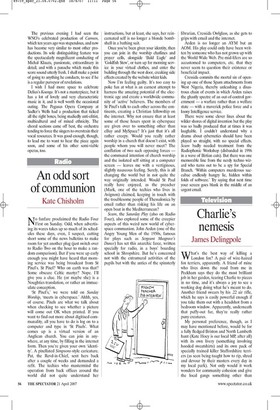An odd sort of communion
Kate Chisholm
No fanfare proclaimed the Radio Four First on Sunday. Odd, when advertising its wares takes up so much of its schedules these days, even, I suspect, cutting short some of the news bulletins to make room for yet another plug (just switch over to Radio Two on the hour to make a random comparison). But if you were up early enough you might have heard that morning service was being broadcast from St Pixel’s. St Pixel? Who on earth was that? Some obscure Celtic martyr? Nope. I’ll give you a clue. He (or maybe she) is a Noughties translation, or rather an immaculate conception.
‘St Pixel’s,’ we were told on Sunday Worship, ‘meets in cyberspace.’ Ahhh, yes, of course. Pixels are what we talk about when checking to see whether a picture will come out OK when printed. If you want to find out more about digitised communality, all you have to do is log on to a computer and type in ‘St Pixels’. What comes up is a virtual version of an Anglican church. You can join in anywhere, at any time, by filling in the internet form. Then you’re given your own ‘identity’. A pixellated Simpsons-style caricature. Pat, the Revd-in-Chief, sent hers back after a couple of weeks and demanded a refit. The techies who mastermind the operation from back offices around the world did not quite understand her instructions, but at least, she says, her reincarnated self is no longer a blonde bombshell in a bathing suit.
Once you’ve been given your identity, then you can join in the worship chatlines and prayer cells, alongside ‘Bald Eagle’ and ‘Goldfish Stew’, or turn up for morning service in your virtual clothes, and enter the building through the west door, creaking side effects created by the website whizz kids.
Now I’m feeling guilty. It’s too easy to poke fun at what is an earnest attempt to harness the amazing potential of the electronic age and create a worldwide community of ‘active’ believers. The members of St Pixel’s talk to each other across the continents, creating a Christian fellowship on the internet. Why not ensure that at least some of those hours spent in cyberspace are given over to something other than eBay and MySpace? It’s just that it’s all rather creepy. Would you really rather worship in a church that doesn’t exist, with people whom you will never meet? The conflation of two such opposing forces the communal intention of church worship and the isolated self sitting at a computer screen — leaves me with a vertiginous, slightly nauseous feeling. Surely, this is all changing the world but in not quite the way originally intended. Would St Paul really have enjoyed, as the preacher (Mark, one of the techies who lives in Avignon) claimed, keeping in touch with the troublesome people of Thessalonica by email rather than risking his life on an open boat in the Mediterranean?
Scam, the Saturday Play (also on Radio Four), also explored some of the creepier aspects of this weird new world of cyberspace communion. John Arden (one of the Angry Young Men of the 1950s, famous for plays such as Sergeant Musgrave’s Dance) has set this anarchic farce, written specially for radio, in a boys’ boarding school in Shropshire. But he’s concerned not with the extramural activities of the pupils but with the antics of the spinsterly librarian, Cressida Owlglass, as she gets to grips with email and the internet.
Arden is no longer an AYM but an AOM. His play could only have been written by someone who has not grown up with the World Wide Web. Pre-mid-lifers are so accustomed to computers, etc. that they never seem to question their existence or beneficial impact.
Cressida commits the mortal sin of opening up one of those Spam attachments from West Nigeria, thereby unleashing a disastrous chain of events in which Arden raises the ghastly spectre of an out-of-control government — a warfare rather than a welfare state — with a maverick police force and a loony Intelligence service.
There were some clever lines about the wilder shores of digital invention but the play was so badly produced that at times it was laughable. I couldn’t understand why a drama about cybernetics should have been played so straight, with no special effects. Scam badly needed treatment from the Radiophonic Workshop (disbanded in 1996 in a wave of Birtian cuts). But there was one memorable line from the nerdy techno wizard who turns out to be a spy for Special Branch. ‘Within computers murderous succubae endlessly hungry lie, hidden within folds of software.’ Try saying that next time your screen goes blank in the middle of an urgent email.


















































































 Previous page
Previous page